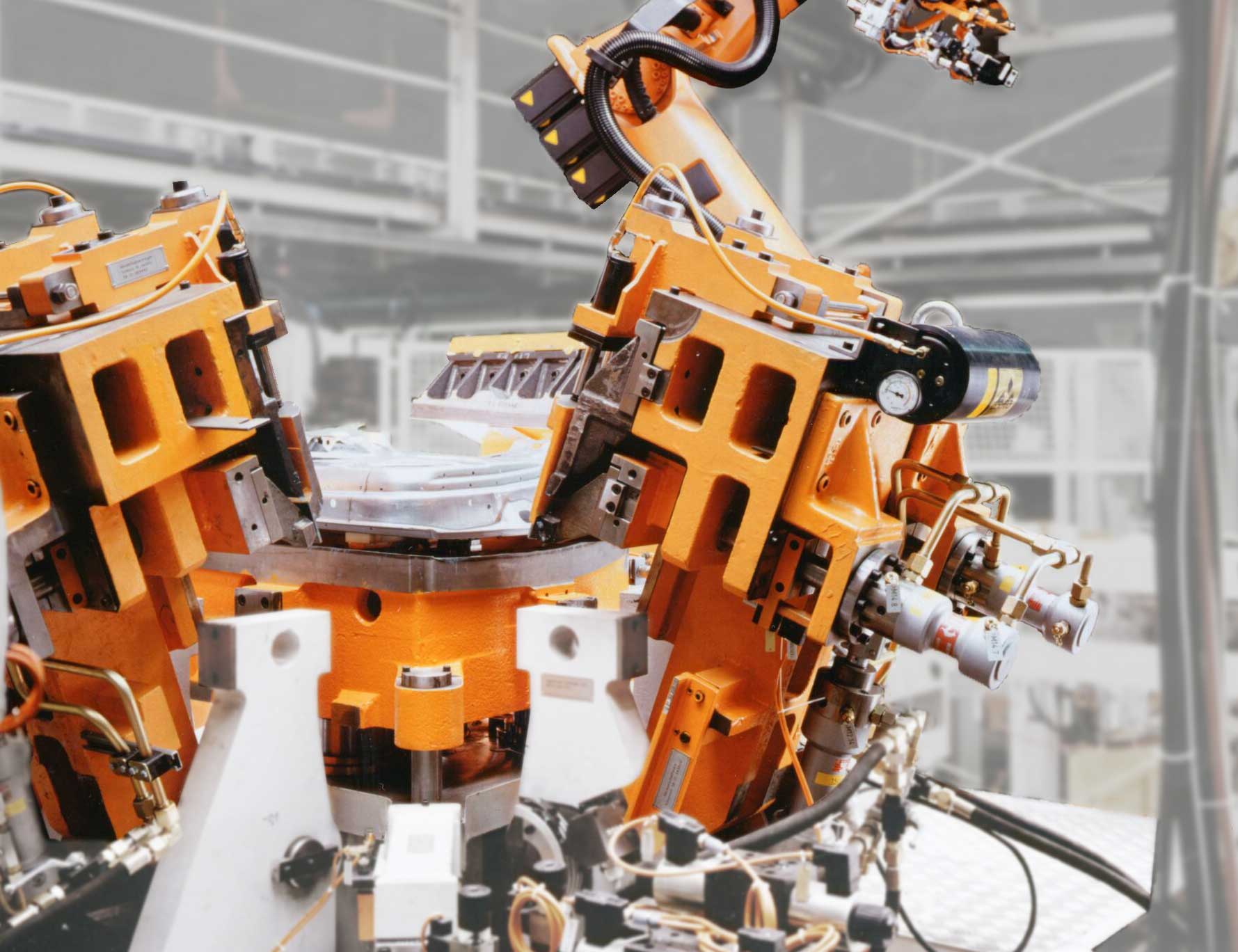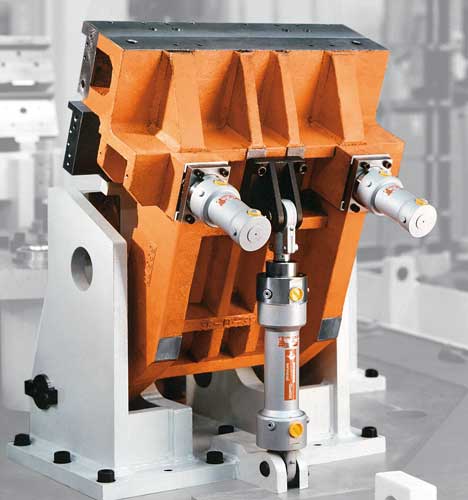Folding machine for the automotive industry
Industrial hydraulic cylinder, standard hydraulic cylinder DIN/ISO
- Long service life of hydraulic cylinders
- Fast spare parts service
- Advice at your location
- Precisely working cylinders



- Pressure of 100 bar at 80 N/mm
- Reliable hydraulic cylinders
- Dimensional accuracy of only ± 0.2 mm
- Folding time of 20 seconds
- Hydraulic cylinder of the 120 series
- Standard cylinder with mounting dimensions according to ISO 6020-1 of series 160
- Sealing system: Servocop®
The main players in this procedure are 13 Hänchen industrial hydraulic cylinders from the catalogue range. Since 1991, Audi's tooling division in Ingolstadt has been using products manufactured by the hydraulic specialist from Ostfildern near Stuttgart in its folding systems. Throughout the entire VW group of companies and elsewhere, these folding systems join the outer and inner sections and the welded assemblies of doors, bonnets and boot lids, and side wall frames without welding. "The industrial hydraulic cylinders are core components which are subjected to maximum requirements", says Dipl.-Ing. (technical college) Ernst Beringer from the Audi tooling division of the requirements. "As a drive with a high level of force and precision, they have to operate non-stop for up to 15 to 17 shifts per week. We initially used tension rods for this task, but these failed to fulfil our requirements as regards stability. We have now been using Hänchen hydraulic cylinders for nine years, and are very satisfied with them." This is expressed, for example, in the fact that no spare parts are stored for industrial hydraulic cylinders. Even an inventory of gaskets is dispensed with, as Hänchen guarantees a world-wide service with 24-hour delivery time for these components. Despite tough competition, the Audi AG tooling division supplies VW companies both at home and abroad, and also produces folding systems for other body construction system suppliers. With the understanding of a system supplier, according to Beringer, these folding systems are used to satisfy customers' high quality standards.
Plug-and-Play unit from the product configurator HäKo
In this case, the industrial hydraulic cylinder is a plug-and-play unit for the system engineers; as a Hänchen standard hydraulic cylinder, its dimensional accuracy is such that replacement can be carried out at any time, and throughout the world, within the Sunday maintenance shift. For the sake of simplicity, only three models are used; each of these is selected and ordered by Beringer and his team with the aid of Hänchen's product configurator HäKo. The cylinders can therefore be adapted to the relevant installation situation in the optimum manner. In addition, the HäKo enables cost-effective purchasing and guarantees the shortest possible delivery times. "This is the start of quality and cost-effectiveness in procurement", says the engineer.
The use of hydraulics
In this case, the quality of folding is especially determined by the folding radius: The smaller the better. In order to achieve this, the Audi engineers proceed as follows: The outer part, whose flange is approximately 90 degrees open, is inserted into the folding system and positioned precisely. A robot adds the welded assembly which is to be joined as the inner part. Industrial hydraulic cylinders close the C-hoops with the folding jaws and position the preliminary folding jaws for the first folding step. A further cylinder moves the folding bed vertically upwards, and subsequently generates the necessary pressure in order to close the fold to an aperture angle of 45°. The preliminary folding jaws are now hydraulically withdrawn again. The folding bed moves against the final folding jaws and closes the fold with a correspondingly high pressure of 100 bar with 80 N/mm calculated along the length of the fold. The system therefore achieves the low bending radius which is required. Finally, the C-hoops are opened again, the folded part is removed from the folding system and further processed in the corresponding production process.
Third generation folding systems
The idea of actuating the preliminary folding jaws via a ram function has made the folding system considerably more compact and inexpensive. In the first generation, preliminary pressing was carried out in a 5-metre high press; final folding was carried out in a further, equally large, unit. In the second generation, the folding jaws were assembled above one another in two separate assemblies. The process was then completed in a 2.2-metre high system. The new systems of the third generation, with the C-hoops, have been in use since 1998, and are now only 1.6 metres high. The low folding time of 20 seconds is achieved as a result of this movement procedure optimisation.
Hydraulics - a significant basis for high precision in folding systems
High-quality hydraulic components create a considerable prerequisite for the fulfilment of customers' requirements for a folding system. These folding systems generate the necessary force and enable a high degree of movement and positioning precision; this is the experience of the Audi tooling division. "In Hänchen, we at Audi have a tried-and-tested partner. In this manner, we are able to achieve gap dimensions which satisfy the world's most stringent requirements with precise, extremely reliable cylinders in compact folding systems", Behringer is convinced.
© Hänchen 2001

